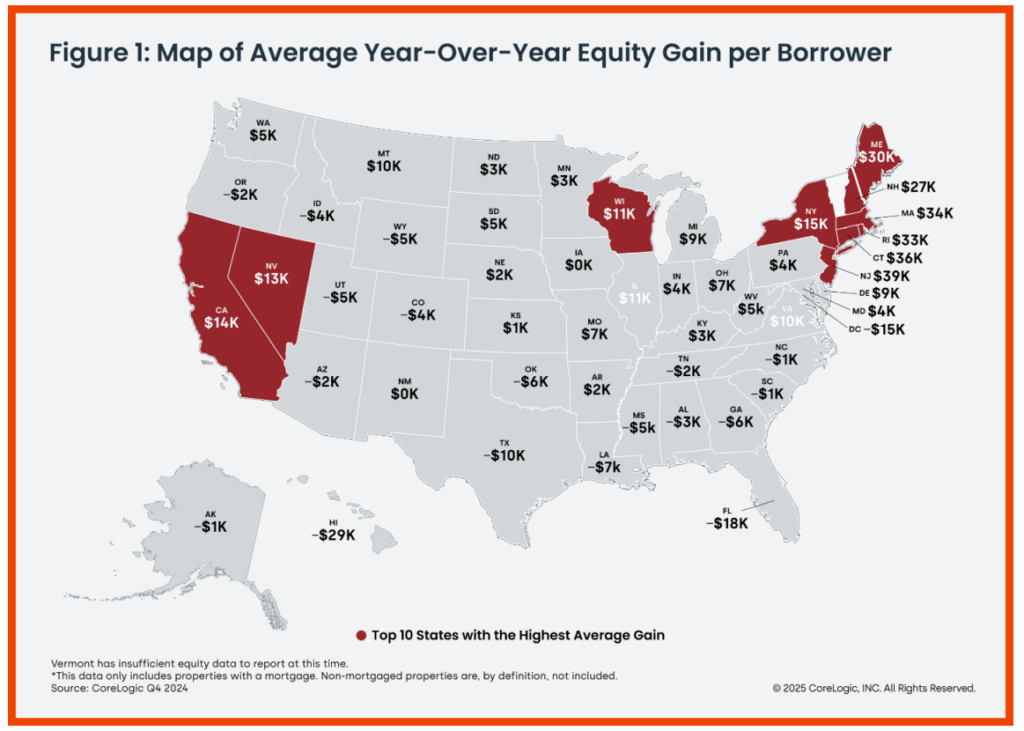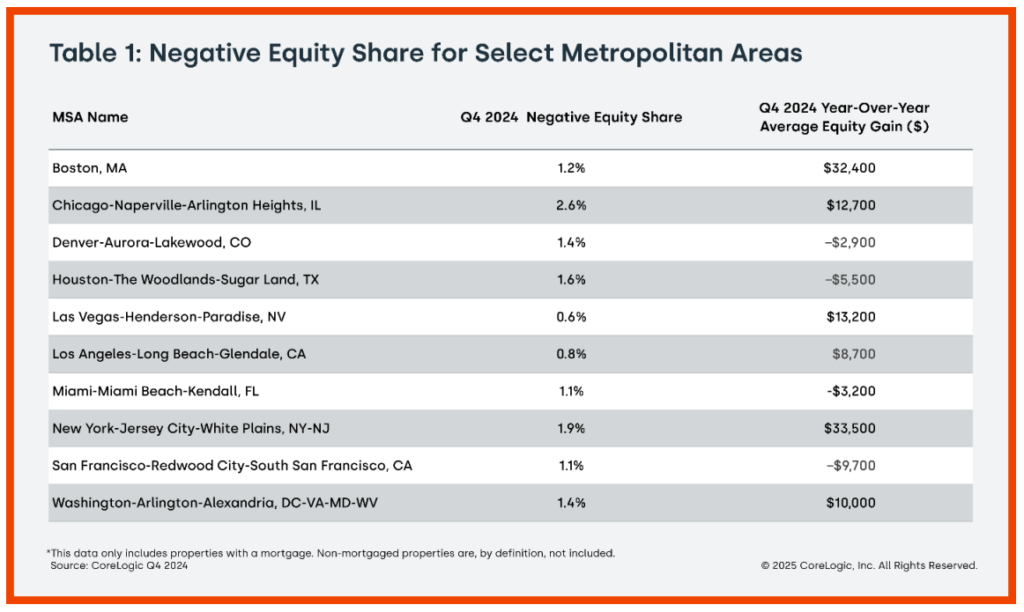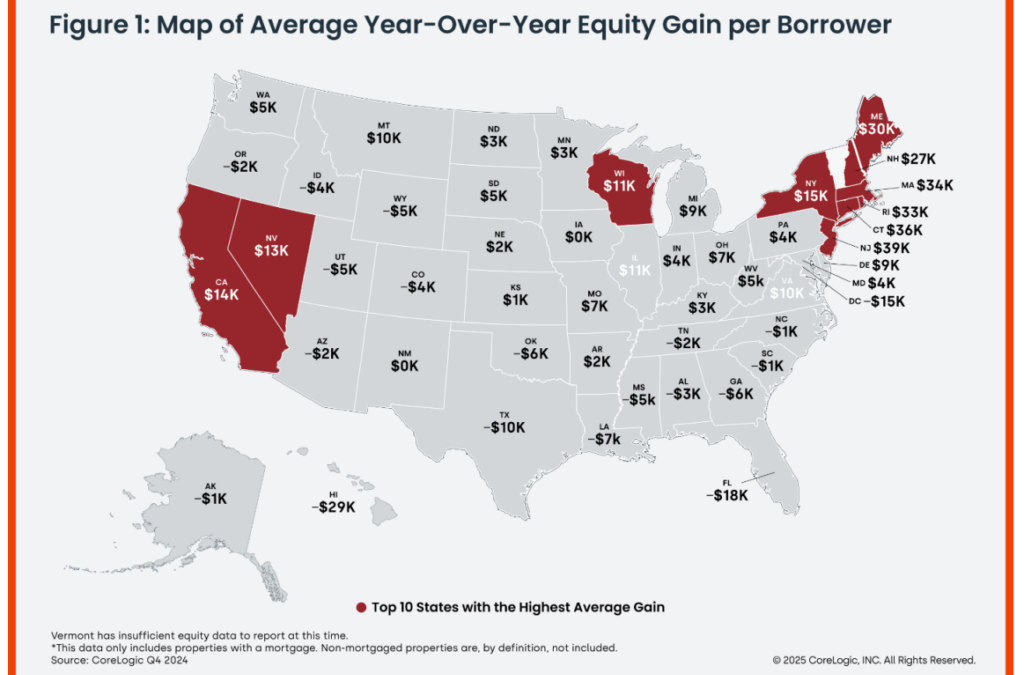Homeowners Have Gained Nearly Three Hundred Billion Dollars in Home Equity MABA MassachusettsRealEstate FirstTimeHomeBuyers MaBuyerAgent
CoreLogic has issued its Homeowner Equity Report (HER) for quarter four of 2024 which found that nationwide, borrower equity increased by two hundred eighty one point nine billion dollars, or one point seven percent year-over-year. CoreLogic’s HER shows that U.S. homeowners with mortgages (which account for roughly sixty one percent of all properties) saw home equity increase by about four thousand one hundred dollars between quarter four 4 2023 and quarter four 2024, which is less than the gain of six thousand dollars in Q3 2023. The states that reported the largest gains in equity included:
- New Jersey (thirty nine thousand and four hundred dollars)
- Connecticut (thirty six thousand three hundred dollars)
- Massachusetts (thirty four thousand four hundred dollars)
Conversely, CoreLogic found the states reporting the largest losses were:
- Hawaii (negative twenty eight thousand and seven hundred dollars)
- Florida (negative eighteen thousand one hundred dollars)
- District of Columbia (negative fourteen thousand and seven hundred dollars)
Quarter-over-quarter, the total number of residential properties with negative equity increased by nine point three percent to one point one million homes or two percent of all mortgaged properties. While year-over-year, negative equity increased by seven percent from one million homes, or one point eight percent of all mortgage properties.
“Housing equity growth slowed in 2024 versus 2020-2023 due to moderating price appreciation, but homeowners maintain substantial equity gains from prior years, preserving their strong financial position,” said Dr. Selma Hepp, Chief Economist for CoreLogic.

While home equity is still boosting homeowners’ wealth, home price appreciation is leveling off and tempering equity gains for homeowners across the U.S. In fact, there are clear regional divisions for equity gains. The Northeast continues to lead the way, with other areas of expanding equity encompassing the upper Midwest as well as California and Nevada. Areas with the largest declines dotted the country, but Florida and Washington D.C. were notable areas with decreases.
Amassing equity does not necessarily stave off the possibility of being underwater on a mortgage. In Chicago, average year-over-year equity gains were just north of twelve thousand dollars, but two point six percent of properties reported negative equity. Nevertheless, past years of rapid growth have left many homeowners with a substantial accumulation of equity. This financial padding can serve as a backstop in the event of a relocation or job loss. Housing equity growth slowed in 2024 versus 2020-2023 due to moderating price appreciation, but homeowners maintain substantial equity gains from prior years, preserving their strong financial position.
Home prices continued to be the major driver of equity shifts and markets with declining prices generally saw fallen equity in 2024. In particular, a number of Florida’s markets, including Cape Coral, Sarasota, Lakeland and Tampa have experienced weakening prices over the past year, which led to Florida’s average equity declining by about eighteen thousand dollars at the end of 2024. Thinking ahead, in light of mass government layoffs in Washington metro region, it is important to note that borrowers in the tri-state area have accumulated between two hundred sixty one thousand dollars (in Maryland), two hundred and eighty seven thousand dollars (in Virginia) and three hundred and fifty three thousand dollars (in Washington DC), in average home equity which will help as a financial buffer but also provide a downpayment in case of a move.
Underwater mortgages apply to borrowers who owe more on their mortgages than their homes are currently worth. Negative equity peaked at twenty six percent of mortgaged residential properties in quarter four 2009 based on CoreLogic equity data analysis, which began in quarter three 2009.

The national aggregate value of negative equity was approximately three hundred and thirty eight billion dollars at the end of quarter four 2024, up quarter-over-quarter by approximately twelve point eight billion dollars or four percent from three hundred and twenty six billion dollars in quarter three 2023. Year-over-year, it was also up by approximately twelve point eight billion dollars or four percent from three hundred and twenty six billion dollars in quarter three of 2023.
Click here for more on CoreLogic’s report on home equity trends.
The post Homeowners Have Gained Nearly $300B in Home Equity first appeared on The MortgagePoint.

FIRST TIME HOMEBUYERS
Who Pays the Home Buyer's Agent?
 Both seller's agent fees and buyer agent's fees are part of a typical real estate transaction and are included in the final negotiated purchase price of the property. There should be no additional fees to the buyer for a buyer's agent above and beyond the negotiated purchase price of a home unless specifically agreed in writing between the buyer and agent before an offer is made.
Both seller's agent fees and buyer agent's fees are part of a typical real estate transaction and are included in the final negotiated purchase price of the property. There should be no additional fees to the buyer for a buyer's agent above and beyond the negotiated purchase price of a home unless specifically agreed in writing between the buyer and agent before an offer is made.
In most cases, the seller's agent pays the buyer's agent for bringing the buyer, negotiating the purchase price and terms, writing a legally correct offer, coordinating inspections, responses, and financing plus handling numerous additional details on the buyer's side of the transaction.
Buyers should avoid contacting seller's agents and sellers directly unless they are comfortable negotiating and representing themselves. That is why it is important for buyers to choose their agents BEFORE they begin looking at homes or as soon as possible if they have begun looking.
Did you know that fewer than one percent of the agents and brokers in Massachusetts have committed to being 100% loyal to their buyers 100% of the time?
To learn more about the pros and cons of various types of buyer agents, or to get a list of experienced local 100% loyal buyer's agents to interview without obligation, click the button below.
Find a Great Buyer Agent!
Article From: "Eric C. Peck" Read full article
Get Started with MABA
For no extra cost, let a MABA buyer agent protect your interests



